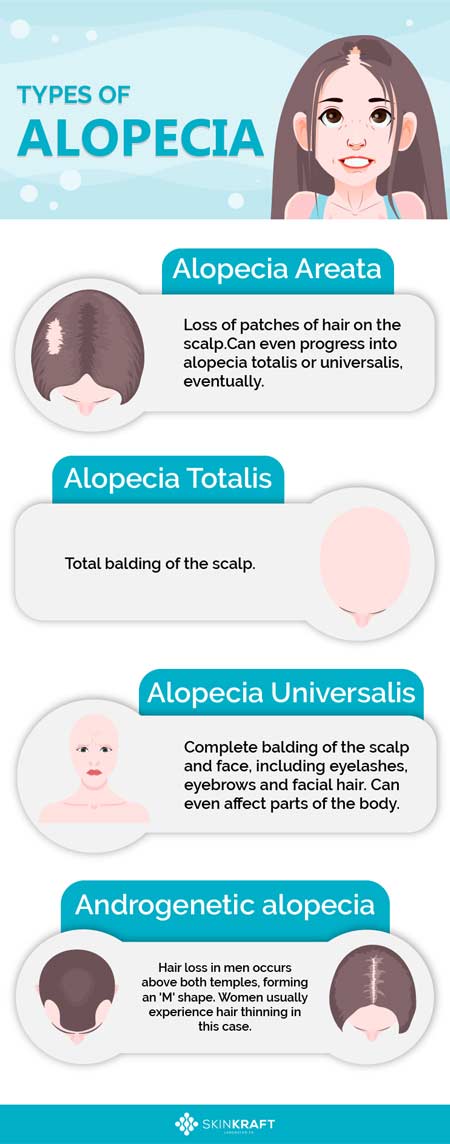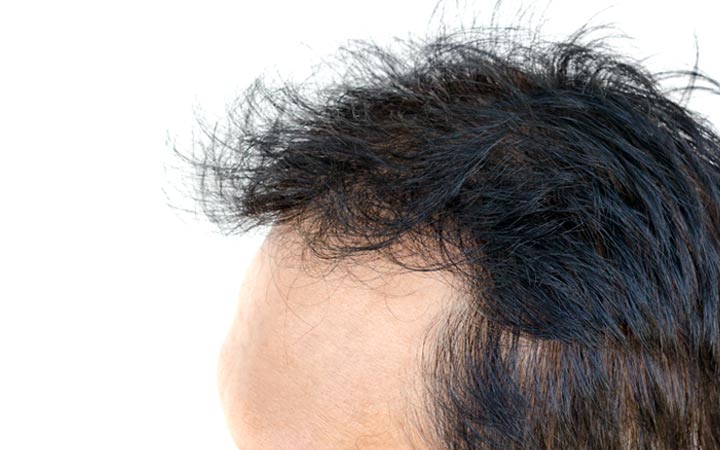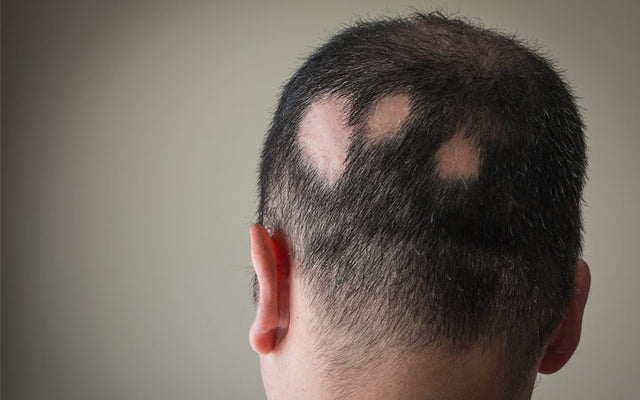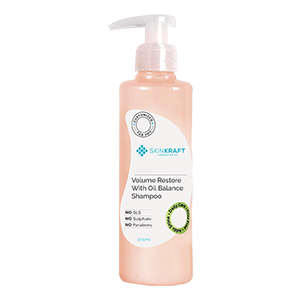We all have immense love for our hair, don’t we? A huge majority of us think that our hair defines our look, and thus, put in a lot of effort to maintain its health. But despite following a strict hair care routine, if you suddenly find bald patches on your head or clumps of hair on your pillow, you must know about Alopecia.
This disease has affected over 147 million people across the world and has no known cure. However, the good news is that a number of topical treatments are available to slow down the hair fall process or help with faster hair regrowth. Keep reading to understand what exactly it is and how you can deal with it.
Highlights:
- What Is Alopecia Areata?
- Symptoms Of Alopecia Areata
- What Are The Types Of Alopecia Areata?
- Dermatological Treatments For Alopecia
- Natural Home Remedies For Alopecia
- Homeopathic Treatments For Alopecia Areata
- What Foods Should You Eat If You Have Alopecia?
- What Foods Should You Avoid If You Have Alopecia?
- Can Your Hair Grow Back If You Have Alopecia Areata?
- How Long Does Alopecia Areata Take To Spread?
- How Long Does Alopecia Last?
What Is Alopecia Areata?
Alopecia areata is an autoimmune disease that causes hair fall from different parts of the body.
Our immune system defends and protects our body from foreign objects like microbes and other aggressors. However, at times our immune system may mistake healthy cells to be foreign bodies and fight against them. This, in turn, can result in a series of conditions, one of them being alopecia areata.
When the hair follicles are attacked, they reduce in size and the production of hair stops. The exact cause of alopecia areata is not known. However, this condition has been linked to those with a family history of autoimmune diseases. [1]
Symptoms Of Alopecia Areata
Alopecia areata is determined by patches of hair loss. These patches can be a few centimeters in size or less.
Some people lose their hair in a similar pattern due to other conditions as well. But in this condition, you may also notice hair fall on parts of your face, including your eyelashes, eyebrows and facial hair. Other parts of your body may also be affected. So it is better to consult your doctor when you see symptoms.
How Do You Notice This?
- Bald spots on your scalp
- Clumps of hair on your pillow covers or in the shower
- Patches of hair loss on other parts of your body
What Are The Types Of Alopecia Areata?

1. Alopecia Areata
This condition is determined by loss of patches of hair. It may continue and result in alopecia totalis or alopecia universalis.
2. Alopecia Totalis
Alopecia totalis is determined by hair loss of the entire scalp.
3. Alopecia Universalis
Alopecia universalis is characterized by loss of hair on the entire face and sometimes even body.
4. Androgenetic Alopecia
Androgenetic alopecia is a form of hair loss that typically forms a pattern on the scalp. In this condition, hair loss in men occurs above both temples to form an ‘M’ shape. In women, the hair becomes thinner across the scalp.
Androgenetic alopecia in men is associated with a number of other medical conditions. Some of these include heart disease and high blood pressure. In women, this condition is associated with polycystic ovary syndrome, a condition that occurs due to hormonal imbalances.

Dermatological Treatments For Alopecia
For this condition, you may have to experiment with a host of medications to know which works better for you.
1. Corticosteroids
These anti-inflammatory medicines tackle immune system responses. They may be injected into the scalp or prescribed topically. Corticosteroides may also be prescribed by your doctor in the form of pills.
Side-effects
- Nausea
- Weight gain
- Stomach irritation
- Mood changes
- Insomnia
- Fluid retention
2. Topical Immunotherapy
This process causes the scalp to react to medication. Chemicals such as SADBE and DPCP are used to trigger allergic reactions. The allergic reaction actually aids in hair growth.
It has to be done consistently in order to keep the hair growing. Topical immunotherapy has been considered an effective treatment for hair re-growth in people with alopecia areata (2) (3).
Side-effect
This process also causes an itchy rash on the scalp.
3. Minoxidil
This solution is applied to the scalp and is commonly used to address pattern baldness. It takes about 12 weeks to notice any changes in hair re-growth.
Side-effects
- Drowsiness
- Nausea
- Tiredness
- Dizziness
- Vomiting
- Changes in color/length of body hair
- Breast pain
- Temporary swelling
Natural Home Remedies For Alopecia
Years of extensive research and personal experiences have shown that the following natural treatments may help people with alopecia areata.
1. Korean Red Ginseng
Ginseng is commonly used as a herbal medicine to address a host of conditions. It is said that the Korean red ginseng may effectively promote hair growth in some people experiencing alopecia areata (4).
2. Stress Management
Stress may contribute to triggering the occurrence of alopecia areata from time to time. Managing stress levels is important to avoid this. Deep breathing, yoga and meditation are some ways of relieving stress in general. However, more research is required to be done on this subject.
3. Onion Juice/Garlic Gel
Studies suggest that applying onion juice or garlic gel to the affected areas may promote hair growth (5). However, more evidence of this is required. This remedy may work only on some people.
4. Aromatherapy With Essential Oils
Oils like rosemary, cedarwood and thyme have proved to be effective remedies that aid-in hair growth in some people with alopecia areata. Regular massages with these essential oils may help regrow the hair. However, more research has to be done on the efficacy of these oils.
5. Massaging The Scalp
It is believed that massaging the scalp for 10-15 minutes everyday can aid in hair growth. This is because massaging generates blood flow to the hair follicles. This gives them the strength to generate new hair strands. It is recommended that in winters, one must massage their scalp with oil regularly to prevent it from getting dry.
6. Ayurvedic Remedies Like Shirolepa & Prachana
According to ancient Ayurveda, shirolepa (or thala pothichil) is specifically designed to treat hair loss. The treatment involves gentle head massages followed by a herbal pack and pouring of herbal oils like brahmi, amla and gotu kola. The process is repeated for 21 days.
Prachana is also an Ayurvedic technique for hair growth, in which tiny needles are used to prick the scalp. Nasya and Rasayana therapies are other treatments that Ayurveda recommends for improving alopecia areata symptoms.
Homeopathic Treatments For Alopecia Areata
Various homeopathic medicines like Silicea 200, Mezereum 200, Syphilinum 200 and Fluoric acid 6 are prescribed by homeopathic doctors to treat alopecia areata. Talk to your homeopathic doctor about which one you should go ahead with, according to your situation and symptoms.
What Foods Should You Eat If You Have Alopecia?
1. Fruits And Vegetables
Bright-colored fruits and vegetables like apples, strawberries, broccoli, spinach and cauliflower among others contain antioxidants. This reduces inflammation in the body that may help in reducing alopecia symptoms.
2. Nuts
Nuts like almonds, walnuts and hazelnuts contain omega 3 fatty acids that are a great way of reducing inflammation and alopecia symptoms.
3. Onions
Rich in antioxidants, consuming onions in any given form can help improve alopecia symptoms.
4. Fish
Another food that is packed with omega 3 fatty acids is fish. Consuming fish can help in improving alopecia symptoms.
5. Protein
Your hair is mainly made up of protein. Protein-rich foods include eggs, meat and beans.
6. Ghee And Oils
Good oils like olive oil contain omega 3 fatty acids that help reduce inflammation. A physician will assess the patient and his/her requirements. Based on the assessment, your physician will recommend certain oils to be consumed along with some herbs.
What Foods Should You Avoid If You Have Alopecia?
1. Dairy Products
Milk contains a protein called casein that is said to irritate the immune system. If it triggers immune system responses, it may contribute to worsening alopecia symptoms.
2. Polyunsaturated Fats
It is advised that you consume boiled/steamed foods instead of fried ones if you have alopecia. This is because oils such as sunflower oil, margarine and corn oil contain bad fats that can contribute to hair loss in people with alopecia.
Can Your Hair Grow Back If You Have Alopecia Areata?
If you have alopecia areata, your hair can grow back. However, there is a possibility that it may fall again. In some cases, hair loss is permanent. Treatment depends from person to person. What may work for one person may not work for another.
How Long Does Alopecia Areata Take To Spread?
Typically, you may notice bald spots spreading quite quickly. However, it can be treated and does not spread to others. Alopecia will not affect your well-being or day-to-day activities and is not a serious condition. The only issue with this condition is that it may be emotionally draining because of its appearance. Learn to accept your body and celebrate it, no matter what.
How Long Does Alopecia Last?
Alopecia symptoms and treatments are different for everybody. It is hard to say how long it will last for. For some, it may take as short as 8 weeks to see improvement with treatment. For others, the same treatment may not work.
It is said that most cases of alopecia areata last for a few months to a year, following which normal hair growth resumes. However, there may be cases of permanent hair loss as well.
Wrapping Up
As Alopecia causes hair loss and bald patches, it can be emotionally draining. However, a number of dermatological treatments and home remedies are available to help hair regrowth in people with alopecia. Those with alopecia tend to either have a family history of the condition or other autoimmune conditions. So, remember to consult your doctor and live your life happily even if the condition does not improve after all treatments.
Recommended Products
Was this Article helpful?
- Least helpful
- Most helpful











